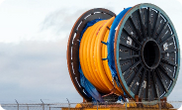Solid vs. Stranded Wire: How to Choose?

Solid and stranded wires are used in electrical projects very often. In fact, each conductor is either solid or stranded. Read this blog to learn the differences between the two and decide once and for all which one is better for your electrical project.
First, let us look into the basic differences between solid and stranded wires. Stranded wire is the collection of thin wires grouped and connected with non-conductive insulation. A solid wire has only one strand of wiring, insulated with a non-conductive material.
Solid vs. Stranded Wire: What Are The Differences?
- Solid wire is slightly cheaper than stranded one because the manufacturing costs are lower.
- Stranded wire has superior flexibility and bendability compared to solid wire.
- Solid wire has anti-corrosive and weather-resistant properties and is resistant to mechanical impact.
- Solid wire has superior current capacity compared to stranded wire, which is an important consideration for house wiring.
- Stranded wire has more attenuation than solid wire.
- In stranded conductors, DC resistance is higher because the cross-section of the conductor contains air in addition to copper. Despite these differences, both solid and stranded wire are good for AC and DC applications alike.
- When it comes to aluminum wiring, solid wires are quite rare, while stranded wires are used in residential applications here and there. Solid aluminum wiring was used in home wiring in the 1960s and 1970s, and are not recommended to use any longer because of the challenges that occur at cable termination.
Solid vs. Stranded Wire: The Bottom Line
While there are apparent differences between solid and stranded wire, choosing one over the other is often a matter of the personal choice of those who install the cabling.
Many electricians note that stranded wire is easier to pull in and out in several years when the wiring needs to be replaced because copper gets harder with years, and stranded wiring has less pulling tension.
Solid wire is usually used when the electrical project requires wiring sized 10 and smaller because it is not difficult to pull in these sizes, and it minimizes the probability of human error when the wiring is terminated because terminating smaller strands could be a challenge to some people. In sizes 8 and above, stranded wire is preferred.
Stranded wiring is used more often unless solid wiring is specified for the electrical project. The more complex the work is with many bends, the more likely stranded wire will be used. Stranded wire is the preferred choice in cases when flexibility is required. However, some electricians use solid wiring simply as a personal preference.
Some cables are available only with solid or stranded conductors, making the concerns irrelevant.
Solid vs. Stranded: What's The Deal With The Data Cables?
When it comes to data cables, or, in particular, category cables like CAT 5e and CAT 6, common preferences are different. For long runs, solid wire is the preferred choice because of the attenuation of stranded wire. Solid wire does not have the same current dissipation as the stranded wire. Stranded wire is used in patch cables because of its excellent flexibility.
For all kinds of solid and stranded wires, visit nassaunationalcable.com


















